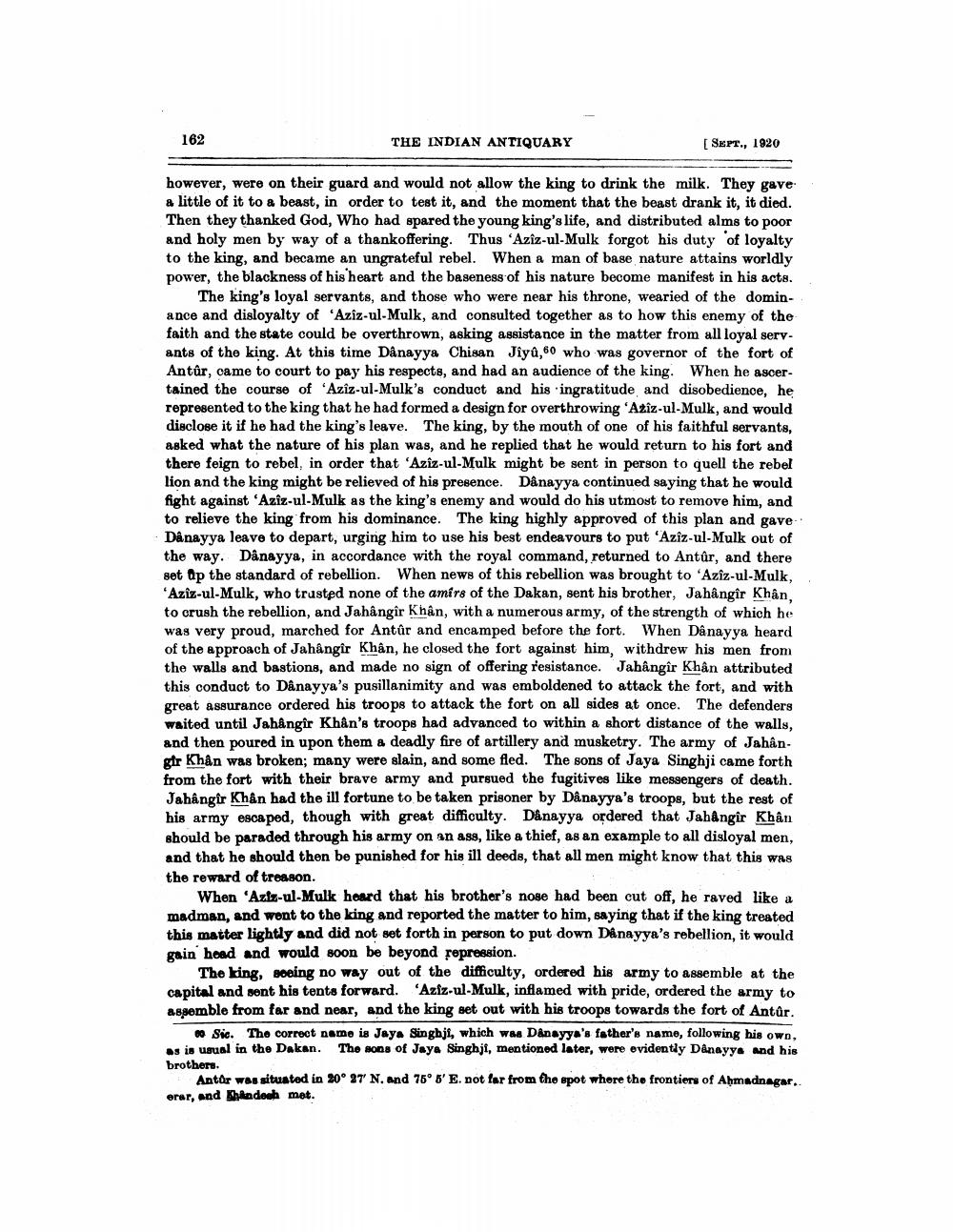________________
162
THE INDIAN ANTIQUARY
[SEPT., 1920
however, were on their guard and would not allow the king to drink the milk. They gave a little of it to a beast, in order to test it, and the moment that the beast drank it, it died. Then they thanked God, Who had spared the young king's life, and distributed alms to poor and holy men by way of a thankoffering. Thus 'Aziz-ul-Mulk forgot his duty of loyalty to the king, and became an ungrateful rebel. When a man of base nature attains worldly power, the blackness of his heart and the baseness of his nature become manifest in his acts.
The king's loyal servants, and those who were near his throne, wearied of the dominance and disloyalty of 'Aziz-ul-Mulk, and consulted together as to how this enemy of the faith and the state could be overthrown, asking assistance in the matter from all loyal servants of the king. At this time Dânayya Chisan Jiyû,60 who was governor of the fort of Antûr, came to court to pay his respects, and had an audience of the king. When he ascertained the course of 'Aziz-ul-Mulk's conduct and his ingratitude and disobedience, he represented to the king that he had formed a design for overthrowing 'Azîz-ul-Mulk, and would disclose it if he had the king's leave. The king, by the mouth of one of his faithful servants, asked what the nature of his plan was, and he replied that he would return to his fort and there feign to rebel, in order that 'Aziz-ul-Mulk might be sent in person to quell the rebel lion and the king might be relieved of his presence. Dânayya continued saying that he would fight against 'Aziz-ul-Mulk as the king's enemy and would do his utmost to remove him, and to relieve the king from his dominance. The king highly approved of this plan and gave Danayya leave to depart, urging him to use his best endeavours to put 'Azîz-ul-Mulk out of the way. Dânayya, in accordance with the royal command, returned to Antûr, and there set up the standard of rebellion. When news of this rebellion was brought to 'Aziz-ul-Mulk, 'Aziz-ul-Mulk, who trusted none of the amirs of the Dakan, sent his brother, Jahangir Khân, to crush the rebellion, and Jahângîr Khân, with a numerous army, of the strength of which he was very proud, marched for Antûr and encamped before the fort. When Dânayya heard of the approach of Jahangir Khân, he closed the fort against him, withdrew his men from the walls and bastions, and made no sign of offering resistance. Jahângîr Khân attributed this conduct to Dânayya's pusillanimity and was emboldened to attack the fort, and with great assurance ordered his troops to attack the fort on all sides at once. The defenders waited until Jahangir Khân's troops had advanced to within a short distance of the walls, and then poured in upon them a deadly fire of artillery and musketry. The army of Jahângir Khan was broken; many were slain, and some fled. The sons of Jaya Singhji came forth from the fort with their brave army and pursued the fugitives like messengers of death. Jahangir Khân had the ill fortune to be taken prisoner by Dânayya's troops, but the rest of his army escaped, though with great difficulty. Dânayya ordered that Jahangir Khân should be paraded through his army on an ass, like a thief, as an example to all disloyal men, and that he should then be punished for his ill deeds, that all men might know that this was the reward of treason.
When 'Aziz-ul-Mulk heard that his brother's nose had been cut off, he raved like a madman, and went to the king and reported the matter to him, saying that if the king treated this matter lightly and did not set forth in person to put down Dânayya's rebellion, it would gain head and would soon be beyond repression.
The king, seeing no way out of the difficulty, ordered his army to assemble at the capital and sent his tents forward. 'Aziz-ul-Mulk, inflamed with pride, ordered the army to assemble from far and near, and the king set out with his troops towards the fort of Antûr.
Sic. The correct name is Jaya Singhji, which was Danayya's father's name, following his own, as is usual in the Dakan. The sons of Jaya Singhji, mentioned later, were evidently Dânayya and his brothers.
Antor was situated in 20° 27′ N. and 75° 5' E. not far from the spot where the frontiers of Ahmadnagar.. erar, and Khandesh met.




